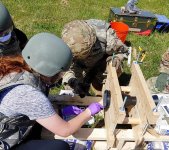Gunpowder used in cannons helped change the nature of warfare, but it took a while to get the recipe just right.
NY Times article here.
(Limited access if, like me, you don't have a NYT account. But there are others which quote it, such as puffnachrichten. Plus a good one in WIRED .)
Cool job! She's a tenured professor of chemistry at the U.S. Military Academy at West Point
From the WIRED article, "Riegner's expertise is in forensic chemistry and developing techniques to remotely detect improvised explosive devices (IEDs), like the kind that were a threat to US troops during conflicts in Iraq and Afghanistan. The exercise in re-creating medieval recipes helped Riegner become a better problem solver when it comes to understanding how current explosives are made, she says...

NY Times article here.
(Limited access if, like me, you don't have a NYT account. But there are others which quote it, such as puffnachrichten. Plus a good one in WIRED .)
Cool job! She's a tenured professor of chemistry at the U.S. Military Academy at West Point
From the WIRED article, "Riegner's expertise is in forensic chemistry and developing techniques to remotely detect improvised explosive devices (IEDs), like the kind that were a threat to US troops during conflicts in Iraq and Afghanistan. The exercise in re-creating medieval recipes helped Riegner become a better problem solver when it comes to understanding how current explosives are made, she says...
Her daughter prepares to light one off. How many kids get to do this, especilally as part of an official experiment at West Point?"...In the early days of the pandemic, Dawn E. Riegner, a chemist at an elite college, found that she had time on her hands because of the empty classrooms. So she filled her downtime with an explosive diversion.
Dr. Riegner talked three of her colleagues — and her daughter — into studying how well different kinds of gunpowder recipes from the Middle Ages performed in firing projectiles out of a replica cannon. Her ambitious plan was relatively easy to carry out because she's a tenured professor of chemistry at the U.S. Military Academy at West Point, N.Y., which gave her access not only to top scholars and laboratories but world-class firing ranges.
"It's a silver lining of the pandemic," Dr. Riegner, whose usual research centers on better detection of explosives and chemical warfare agents, said in an interview of the gunpowder study. "It's been one of the greatest things..."

